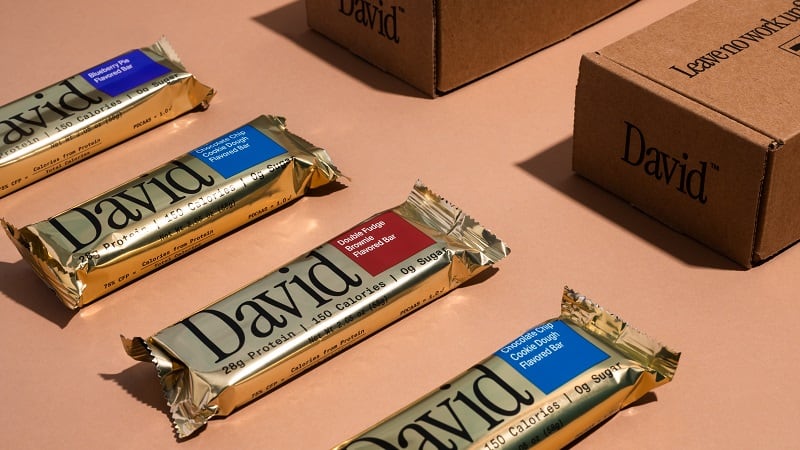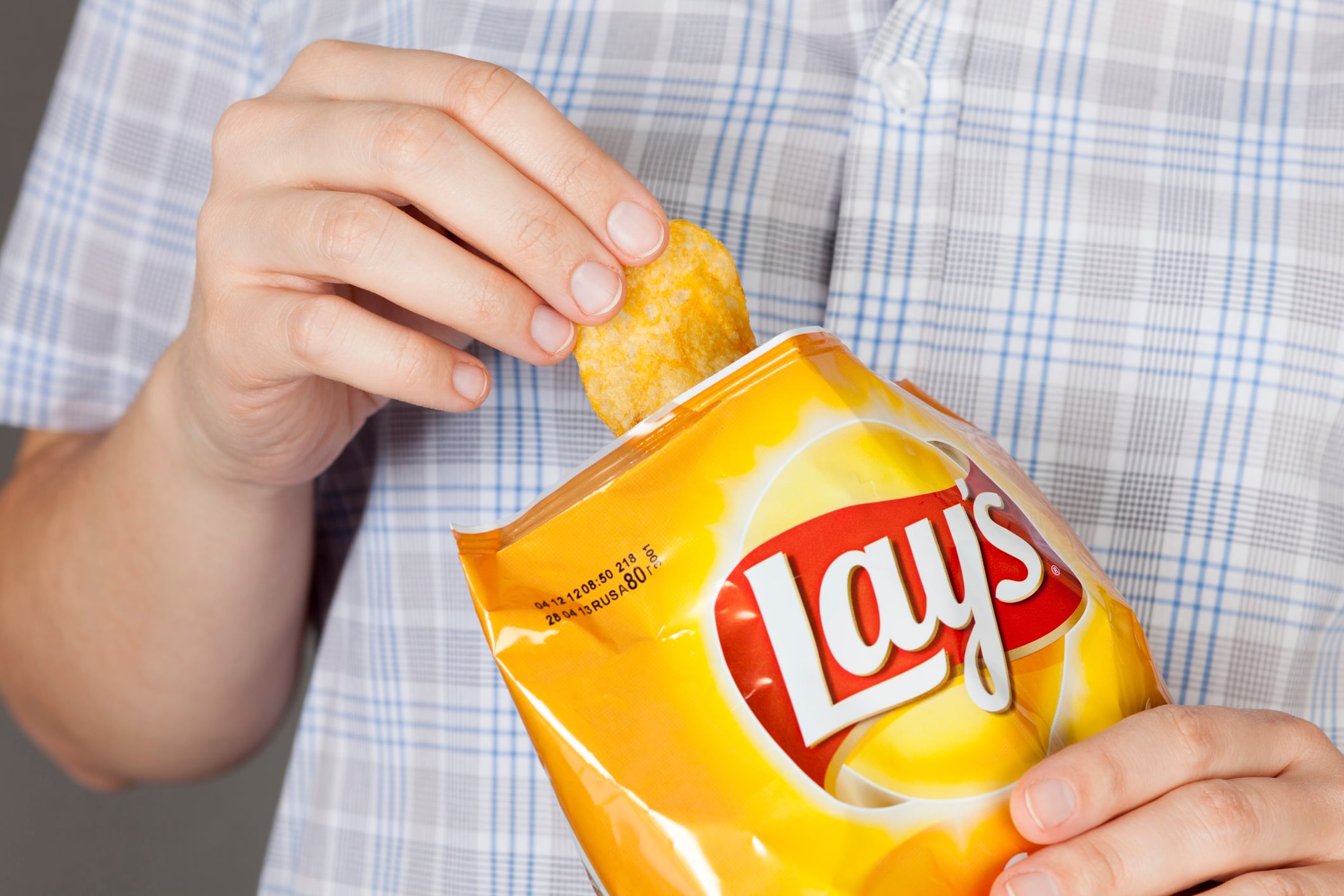Key takeaways:
- David Protein soared to $85m in funding and 3,000 US retail doors within a year.
- Rivals claim its Epogee acquisition cut them off from a vital fat substitute, while David calls it supply security.
- The case raises bigger questions about competition, ingredients and the future of the snack aisle.
David Protein was meant to be the snack story of the year. Since its September 2024 launch, the US brand has raced onto shelves in more than 3,000 stores, pulled in $85 million in funding and was confidently forecasting $100 million in revenue before its first birthday. Its hero bar – 28 grams of protein, zero sugar, 150 calories – was billed as nothing less than a ‘solution to a broken food system’.
Cofounder and CEO Peter Rahal, best known for creating RXBar, cast the objective in lofty terms.
“Our mission is simple: to remove unnecessary calories and sugar from the American diet and replace them with what the body actually needs, which is high-quality protein,” he said in a release, adding the consumer response had been “overwhelming.” Investors agreed. Greenoaks partner Neil Shah said the bar was “delivering a high-protein and low-calorie bar that customers truly crave,” backed by some of the most enthusiastic feedback the firm had seen in consumer goods.
But the rocket-fuel narrative started to sputter this summer. In June, three smaller snack makers that also relied on the same fat-replacement ingredient used in David bars sued the New York company, accusing it of cornering supply. Now, the dispute has escalated, with David moving to have the case tossed out of court.
A legal clash over control of EPG
On August 13, David’s legal team asked Judge Victor Marrero of the Southern District of New York for the green light to file a motion to dismiss. Their argument was blunt: the Second Amended Complaint, they said, “fails as a matter of law based on [plaintiffs’] own allegations, and not on contested facts.”
At the heart of the fight is Epogee and its trademark ingredient, EPG – a modified fat substitute with just 0.7 calories per gram. David bought Epogee in May, only days before the lawsuit landed and soon after restricted outside access.
For the plaintiffs – Own Your Hunger, Lighten Up Foods and Defiant Foods – the fallout has been brutal. Defiant’s cofounder Mckay Fugal said his company’s chocolate bar simply can’s exist without EPG. “Fat is a very important part of chocolate and without it, we wouldn’t be able to call our product ‘chocolate,’” he said. “All of us [companies] have built our businesses around EPG as a key ingredient. Without it, we don’t have a product, so David effectively put a lot of small businesses out.”
Own Your Hunger has already told its customers that several spreads will have to be pulled from shelves. “We regret to inform you that we must discontinue our hazelnut spreads and our peanut butter spreads, as well as our Wondersquares, for a specific period of time,” founder Ruz Safai wrote on its website, stressing the Canadian company’s immediate focus is now on survival.
David insists its move was about resilience, not exclusion. When announcing the Epogee acquisition, Rahal said: “Acquiring Epogee strengthens our ability to scale by securing a key ingredient that helps us reduce calories and fat without compromising taste. This is about gaining control over our supply chain to move faster, stay true to our mission and deliver food that improves health.”
In court filings, David’s attorneys hammered home that point. They argue the plaintiffs can’t prove EPG is unique, noting even the challengers admit it can be swapped for other fats like palm, coconut or canola oil. They cite Nick’s Ice Cream as proof that brands can reformulate without EPG. “Because the SAC excludes these reasonably interchangeable substitutes from the alleged product market, it must be dismissed,” the letter states.
David’s team also highlights Epogee’s patent protections. “Plaintiffs’ allegations, at most, describe a patentholder exercising its lawful power to exclude,” the defense said, pointing out that US law gives companies wide leeway to decide who can buy their patented products.
Nutrition and image concerns

Even if the courts side with David, questions about the bar’s nutrition profile aren’t going away. Its protein punch comes from milk protein isolate, whey concentrate, collagen and egg whites.
Collagen, though, remains a controversial ingredient. Unlike soy or whey, it isn’t a complete protein – it lacks the amino acid tryptophan – and its benefits for skin, hair and joints are still debated. Some studies have also questioned whether collagen survives digestion in a form the body can actually use, leaving plenty of experts skeptical.
The formula also relies on EPG itself, an ingredient made by modifying canola oil into a non-digestible fat. While it cuts calories and mimics texture, some consumers report stomach discomfort. Sugar alcohols such as maltitol and artificial sweeteners like sucralose come with similar warnings, often linked to bloating or laxative effects when consumed in quantity.
Then there are environmental questions. Palm kernel oil and coconut oil – both used in David bars – are frequently criticized for their role in deforestation and high carbon impacts. That makes the brand’s pitch as a fix for a ‘broken food system’ a harder sell for sustainability-minded shoppers.
And customers are starting to push back. One Reddit user wrote an open letter urging the company to avoid “contemplating a monopoly on EPG,” warning that loyal fans of smaller brands would be “devastated if our cherished and relied-upon brands disappear.” On Instagram, David’s team responded its decision was about “securing supply chain integrity” rather than disruption, but conceded, “we hear you and we don’t take lightly the impact this may have had on others in the space.”
The bigger snack picture

This fight is bigger than one brand. Protein has been the buzzword in snacking for more than a decade, sending investors chasing the ‘next RXBar’ and pushing brands to squeeze in more grams per bite. But the David case exposes the risks of tying growth to tight control over a single ingredient rather than competing on innovation.
For the plaintiffs, the stakes are existential. Their lawsuit cites $107,000 in lost sales, nearly half a million sunk into R&D and ongoing monthly losses. As Defiant’s Fugal put it: “I just believe there should be competition and they shouldn’t try to stop others from using EPG. It’s disappointing to see that this is the move they’ve taken.”
For David, the case is a referendum on whether aggressive supply-chain plays will be seen as smart strategy or anticompetitive strong-arming. A quick dismissal would give the brand breathing room. A drawn-out court battle, though, could expose its playbook and leave scars that no protein bar can cover.
And for consumers, the fight shines a light on what ‘healthy innovation’ really means. Is a bar boasting 28g of protein but built on modified oils, sweeteners and disputed additives a genuine step forward or just another ultra-processed stopgap in the snack aisle?
Research into so-called Blue Zone communities, where people often live longer, healthier lives, points in a different direction. Diets there are largely plant-based and rely far less on engineered products. That doesn’t mean there’s no place for protein bars, but most experts argue that whole foods deliver better, more lasting benefits when it comes to energy, satiety and overall health.
Whatever the verdict, the David Protein case is a moment of reckoning for the snack industry. It shows the limits of functional hype, the fragility of ingredient supply chains and the uncomfortable trade-off between scaling fast and playing fair. The country’s fastest-rising protein bar has become a lightning rod and the decision could shape not just David’s future, but the rules of the snack aisle for years to come.
David Protein has not yet responded to a request for comment.
Studies:
de Miranda RB, Weimer P, Rossi RC. Effects of hydrolyzed collagen supplementation on skin aging: a systematic review and meta-analysis. Int J Dermatol. 2021 Dec;60(12):1449-1461. doi: 10.1111/ijd.15518. Epub 2021 Mar 20. PMID: 33742704.
Buettner D, Skemp S. Blue Zones: Lessons From the World’s Longest Lived. Am J Lifestyle Med. 2016 Jul 7;10(5):318-321. doi: 10.1177/1559827616637066. PMID: 30202288; PMCID: PMC6125071.




